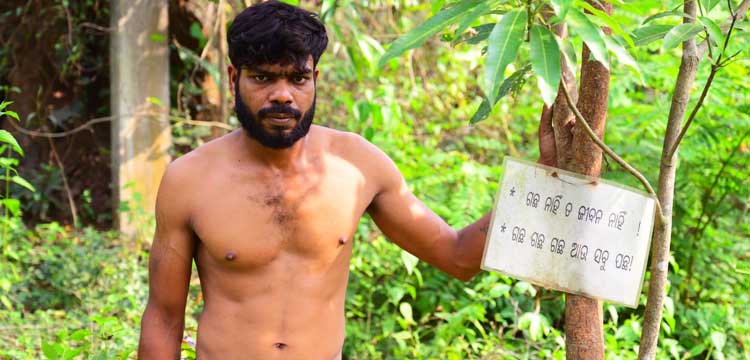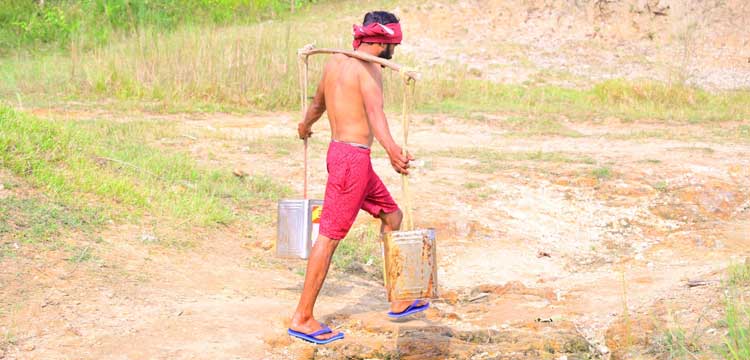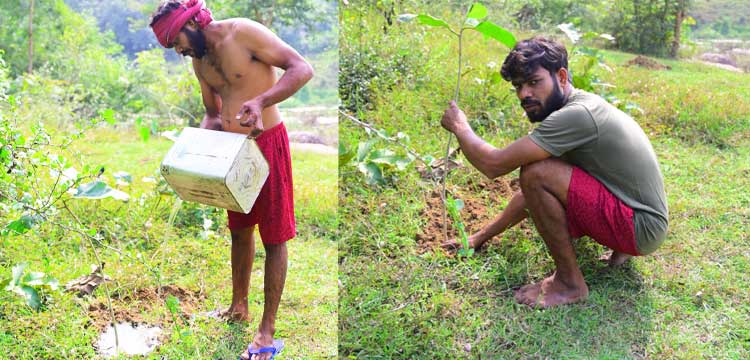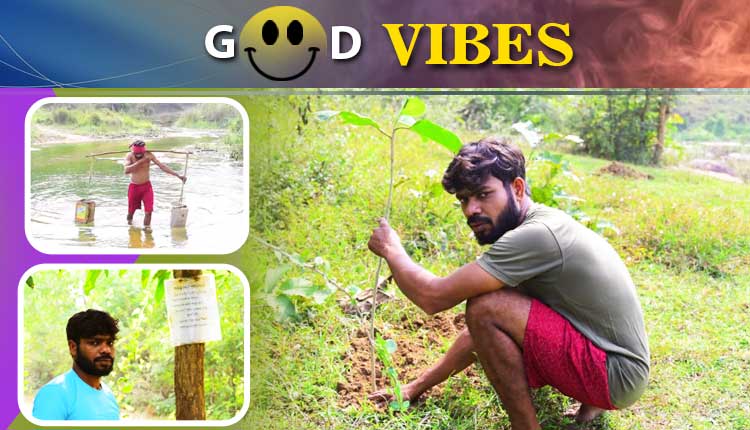Medicinal plants, undoubtedly, play a vital role in the development of life-saving medicines. We cannot deny the fact that though science has progressed by leaps and bounds, it can’t develop medicines in labs without extracting the essence from plants. Learning about medicinal herbs and plants is not just enough, growing and preserving them also for our wellbeing is the need of the hour. This is what said the 31-year-old Pupun Sahoo who has transformed a barren land into a thriving medicinal garden by cultivating nearly 7,000 medicinal plants so far.
Hailing from Bhadikila village in Nayagarh’s Odgaon block, Pupun has created two mini forests on the Kusumi riverbank to combat natural calamity apart from growing medicinal and herbal plants on the premises of Mahima Alekha Ashram. He has nurtured saplings and medicinal plants like mulberry, cinnamon, cloves, amla, and saffron, creating a diverse ecosystem that attracts various flora and fauna.
Ommcom News meets this humble hero who has silently yet steadfastly championed the cause of environmental conservation.
 “Growing up in a rural pocket, I have witnessed the decline of medicinal plants. I noticed one thing over the years how my community’s reliance on traditional remedies was under threat due to deforestation, urbanization, and neglect. This sparked a sense of responsibility within me, driving me to learn more about the plants and their properties. I spent countless hours researching, experimenting, and consulting with local healers. Despite being a Class-VII dropout, I realised the need to conserve the healing plants. I was very much passionate about planting medicinal plants so I did not hesitate to quit my traditional occupation which was carpentry so that I would completely dedicate myself to the noble cause. As I grew, so did his concern for a greener world. This concern blossomed into a mission, driving me to dedicate my life to environmental stewardship”, said Pupun who has recently been awarded by a vernacular daily for his achievement.
“Growing up in a rural pocket, I have witnessed the decline of medicinal plants. I noticed one thing over the years how my community’s reliance on traditional remedies was under threat due to deforestation, urbanization, and neglect. This sparked a sense of responsibility within me, driving me to learn more about the plants and their properties. I spent countless hours researching, experimenting, and consulting with local healers. Despite being a Class-VII dropout, I realised the need to conserve the healing plants. I was very much passionate about planting medicinal plants so I did not hesitate to quit my traditional occupation which was carpentry so that I would completely dedicate myself to the noble cause. As I grew, so did his concern for a greener world. This concern blossomed into a mission, driving me to dedicate my life to environmental stewardship”, said Pupun who has recently been awarded by a vernacular daily for his achievement.
 Despite facing setbacks, such as devastating forest fires, Pupun’s aim remains unshaken.
Despite facing setbacks, such as devastating forest fires, Pupun’s aim remains unshaken.
He said, “I still remember the day forest fires swept through my garden, destroying nearly 100 of my young trees. The loss was crushing, but I refused to let it dampen my spirit. Instead, I chose to rise from the ashes, just like the very trees I nurture. My resolve remains unshaken, fuelled by my passion for conservation. I continue to tend to saplings near the ashram, carefully cultivating a haven for medicinal plants. Mulberry, cinnamon, cloves, amla, and saffron thrive under my care, transforming the garden into a vibrant tapestry of life.”
 Pupun attributes his success to his maternal grandfather, who instilled in him the value of planting trees.
Pupun attributes his success to his maternal grandfather, who instilled in him the value of planting trees.
Reflecting on his childhood, Pupun fondly recalls, “My grandfather taught me the significance of tree planting, sparking a passion that would one day flourish into a thriving medical garden.”
However, not everyone shared Pupun’s enthusiasm. His father, though well-intentioned, initially disapproved of his son’s decision to quit his occupation and pursue tree planting, terming it a ‘waste of time’. As Pupun’s dream began to take shape, his father’s fear changed into unwavering support for his son.
“My father played an important role in transforming the barren land into a lush medical garden and two mini forests. When I needed help fetching water from distant sources to irrigate the plants, he and some like-minded friends rallied around me. Today, as I tend to my garden, I remember my grandfather’s wisdom and my father’s unwavering support,” Pupun acknowledges.
“This herbal garden is the culmination of his 10 years of hard work. He gathered seeds from different regions, focusing on plants with medicinal value. So far, there are around 5,000 medicinal plants, and their number will continue to grow. By the next growing season, this garden will be fully operational on a larger scale,” he signed off.
By Rashmi Rekha Das
















